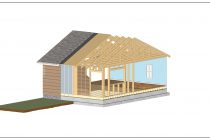Mold, volatile organic and inorganic compounds, inadequate ventilation and a host of invisible issues in a home can prove harmful to human health. Our 4-day seminar will show you how to create a home that supports human health, the natural environment, and planetary ecology by teaching you the inverse principle of methods and practices. Explore with us the design and build phase methods that minimize or eliminate indoor environmental toxins.
Join us on this 4-day exploration of materials, furnishings, and finishes, heating and cooling systems, thermal and moisture movement, building envelopes, and safe, sustainable, technologically sound methods and practices aligned with The 25 Building Biology Principles.
Watch instructor Stephen Collette’s introductory seminar overview video here below. His daily lectures and attendant live Q&A and review sessions will be held online, via Zoom.
Download the syllabus: synopsis, daily schedule, logistics, etc.
We also suggest checking out Paula Baker-Laporte’s fine book Prescriptions for a Healthy House, by clicking here.
Stephen and our institute welcome and encourage enrollees from all backgrounds and education levels to immerse themselves in this meaningful and fulfilling 4-day learning experience.
This seminar is one of three that are required for BBNC Certification. It will be followed after a one-day break by IBE 215, which is also required for BBNC Certification.
All monies expressed herein are US Dollars. Payments are refundable up to 30 days prior to the first day of classes.
 |
$1,765: Click here to pay (you’ll be prompted to login or to create a free BBI account) |
 |
$425: Reserve your space (you’ll be prompted to login or create a free BBI account). |
BBI reserves the right to deny/rescind enrollment, whether first-time or continuing, to students it deems to present the actual or anticipated risk of being or becoming disruptive of our program presentations, and/or a distraction for our students from what they have come to us to learn and experience.



